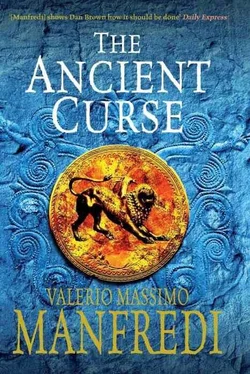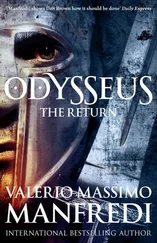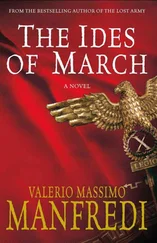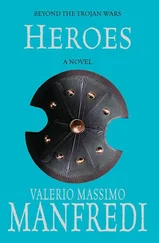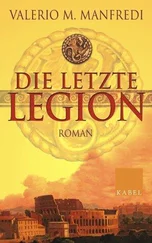Reggiani looked straight into his eyes and spoke slowly. ‘There are no lions in the area, or panthers, or leopards. I’ve had half of the province inspected. I’ve alerted all our stations, the police, the traffic authorities, even the fire department. There are no circuses or Gypsy camps, no reports of private residences keeping exotic animals. I’ve gone down the list of animal food stores, butchers’ shops, slaughterhouses to check if anyone’s been buying suspicious quantities of meat. And I’ve turned up nothing.’
La Bella lit another cigarette with the stub of the first, making the air in the little room unbreathable.
‘I know I’m not wrong,’ he insisted. ‘Find the animal that did this, Lieutenant, or I’ll soon be slicing into someone else here on my table.’
‘What about the time of death?’
‘There’s no doubt about that: between two and three o’clock last night.’
‘Aren’t there any other tests that could be done – I don’t know, the DNA of the animal’s saliva – so at least we know what we’re looking for?’
La Bella put out the second cigarette and burst into a hacking cough that seemed to suffocate him while it lasted. When he could breathe again, he said, ‘You must have seen that in some American movie, Lieutenant. Before the file is closed, there won’t be anything but the bones left on this one. The kinds of tests you’re talking about cost a lot of money. They’re only done if there’s been a sexual assault, rape. This is just a poor tomb robber who no one could care less about.’
‘We’ll see,’ said Reggiani. ‘Have you already written a report?’
La Bella opened a drawer and pulled out a folder. ‘Here you are, Lieutenant.’
Reggiani thanked him, shook his hand and said goodbye. As he was leaving he turned, gripping the door handle. ‘You must have some idea, right?’
‘I do,’ replied La Bella. ‘If I had to picture it, I’d say an animal weighing at least a hundred, a hundred and twenty kilos, with powerful claws and fangs six or seven centimetres long, jaws strong enough to break a bull’s backbone. So… a female lion, for example, or a panther. Oh, by the way, I had the crime lab check for hairs, but they found nothing. Isn’t that incredible? Not a single hair. What about you? Did you sweep the site?’
Reggiani shook his head in commiseration. ‘That’s the first thing I did. The ground was inspected over an area of four or five metres all around the spot where Ronchetti’s corpse was found and what we came up with was turned over to the lab.’
‘Well, then?’
‘Human hairs: Ronchetti’s. No trace of anything else, not even cat hair.’
La Bella got up to accompany him out. ‘I don’t know what else to say, my dear Lieutenant. If it’s so important to you, I can see about a DNA analysis.’
‘Yes, please.’
‘But I’m not promising anything.’
‘Naturally.’
Soon his Alfa Romeo pulled out, tyres squealing, and took off in the direction of Volterra. Once he was back in his office, Reggiani picked up the phone and dialled a mobile number.
‘Sergeant Massaro,’ replied the voice on the other end.
‘This is Lieutenant Reggiani. How are things going there?’
‘Nothing’s happened, sir. In half an hour the replacements should show up, for us and the Finanza agents.’
‘All right, but don’t let your guard down. Don’t play cards, don’t read comics, don’t sleep in the squad car. Keep your eyes open and each other’s arses covered, because you’re in danger. Get that? Your lives are in danger. Is that clear?’
There was a momentary pause on the other end, then the voice answered, ‘Perfectly clear, sir. We’ll be careful.’
Reggiani looked at his watch: one a.m. He loosened his tie and unbuttoned his jacket, leaned back into his chair and sighed. It felt like the night would never end.
FABRIZIO left the house at seven and drove directly to the excavation site, where the carabiniere on guard greeted him.
‘How’d it go last night?’ asked Fabrizio.
‘Fine. We didn’t see a soul.’
‘Thank God. If you like, you can go.’
‘No, the lieutenant says it’s best for one of us to stick around. You never know. Another agent’s coming to relieve me in an hour’s time and I’m hoping he brings coffee.’
‘I have coffee for you,’ said Fabrizio, unscrewing the cap of a Thermos he took from his backpack. ‘I’m never awake before I’ve had three cups, so I always carry extra with me. I see the workers haven’t shown up yet.’
He sat on a block of smooth tufa, while the carabiniere remained on his feet with his left hand resting on the trigger of his sub-machine gun as they sipped their coffee in the cool morning air. A lovely October morning, with the leaves just turning colour and the hawthorn and dog-rose berries taking on red and orange hues.
The pickup with the workers and the gear arrived and Fabrizio walked over to the driver.
‘I think the door is resting on its hinges, stone on stone. We’ll have to clear away at least five centimetres under the wings, then clean the hinges by hosing them down with water and hope the door will open by pushing it back.’
The workers set about the task, using their pickaxes first to prise off the latch that crossed the two wings and then their mattocks to clear away the soil underneath the door. When they had worked their way down to a thin layer of earth, Fabrizio took over, using his trowel to scrape away the last centimetres, a little at a time, until the edge slipped inside.
The air flowing out brought no particular smell to his nostrils, apart from the odour of damp earth. The unmistakable whiff of millennia, so familiar to an archaeologist’s nose, had been lost when the tomb robbers broke in. When the soil underneath the door had all been cleared away, he used the nozzle of a small compressor connected to a generator and freed the hinges of encrusted dirt with a pressure wash. The time had come to open the doors.
He got to his feet and motioned for the workers to join him. One on the right and the other on the left, with him in the centre, pushing at the meeting point of the two door panels. They began applying steady, uniform pressure under Fabrizio’s direction.
‘Slowly, slowly, here we go. There’s no rush. Just a bit more now…’
The two door panels finally separated from each other with a slight grinding of fine sand, letting the first beam of light into the tomb after 2,500 years. The scowl of Charun – the demon who accompanied the dead to the other world – greeted him. A fresco of good quality, the work of an artist from Tarquinia, Fabrizio thought at first glance. He had the men push the wings open further, enough to allow him to enter with ease. He turned around before he went in, remembering Francesca’s words and hoping that she’d be there to share this emotional moment with him. No one.
It was twelve o’clock exactly when he entered under the sign of the new moon and stepped across the threshold of the ancient tomb. He waited to allow his vision to adjust to the shadowy light and to the contrast between the sliver of wall illuminated by the bright sun and the gloom all around.
It was on his left that he first distinguished the body of a reclining woman sculpted softly into a block of alabaster. The statue represented a person at the height of her beauty, at an age which wasn’t definable, maybe thirty or so. She was resting on her right elbow so that she faced the other sarcophagus on the opposite wall. The contrast was striking: the second coffin was a bare, roughly carved block of sandstone, without the slightest embellishment of any sort.
The female figure was wearing her jewellery: a necklace, a bracelet, rings and earrings, and her hair was gathered at the nape of her neck with a ribbon. Her facial expression, in the pale flesh tones of the alabaster, was extraordinarily sweet, but a further glance revealed an intense, pained pride.
Читать дальше
